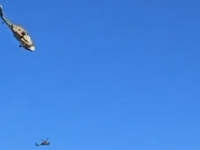Anyone who has visited Jerusalem will have appreciated the intensity of listening to the Muslim call to prayer reverberating across the roofs of the ancient city. It is, as much as negotiating the narrow souqs and appreciating the sounds of church bells and Jewish prayers, one of the quintessential parts of experiencing the city.
Now, however, Israel’s Prime Minister Benjamin Netanyahu has backed a bill to ban the broadcasting of what he termed “excessive noise” from loudspeaker systems in Israeli cities.
In a cabinet meeting on Sunday, Netanyahu said that on numerous occasions "citizens have turned to me from all parts of Israeli society, from all religions, with complaints about the noise and suffering caused to them by the excessive noise coming from the public address systems of houses of prayer." He added that Israel is committed to respecting the right to worship of all religions, but that it is also committed to the protection of people from noise caused by loudspeakers, pointing out that similar bills are in place in countries across Europe.
The bill was proposed by Moti Yogev, a member of the Knesset for the Jewish Home party, and an occupant of an illegal West Bank settlement. He has said that “The bill comes from a view that freedom of religion should not harm quality of life”. He also added, displaying his ignorance of the contents of the call to prayer, that it could be used to incite violence.
However, while the proposed bill would apply to all places of worship, this has been perceived by many Palestinians as yet another act of discrimination against Muslims. This is particularly the case as the bill has been nicknamed the “Muezzin bill”, signaling that its target is the Muslim call to prayer, and not that of any other religious group. The proposal has faced opposition from some Israeli politicians and from Palestinian leadership.
The official spokesman for the Palestinian presidency, Nabil Abu Rudeina, warned on Sunday of "the seriousness of the recent Israeli actions which will drag the region into disaster," suggesting that they consider such actions to be completely unacceptable, and that Palestinian leadership will go to the UN Security Council and to international institutions to stop them.
Hamas has also described Netanyahu’s statement as "a dangerous development coming in the context of the scheme to change of the landmarks of Jerusalem and its mosques and the obliteration of its Islamic identity," Russia Today reported.
Some used social media to express their dismay at the proposal, as #TheMuezzinWillNotBeQuiet was trending on Twitter in Jerusalem:
الله اكبر عند كل اذان #لن_يسكت_المؤذن
—رهف محمد(@asd1999012) November 14, 2016
تضامن مع القدس الشريف الاحتلال يمنع المؤذن#قروب_رهف_للدعم#قروب_سارا_للدعم#ضامى_الشوق_للدعم
"God is the greatest" at every call to prayer. #TheMuezzinWillNotBeQuiet Solidarity with Jerusalem as the occupation prevents the call to prayer.
@jhelles مش عاجبهم صوت الاذان يرجعوا ع بلادهم فش فيها اذان ولا مكبرات صوت
— القدس تجمعنا (@osamasoboh2) November 13, 2016
If they don’t like the sound of the call to prayer then they can go back to their countries where there is no call to prayer, and no loudspeakers.
الله أكبر#لن_تسكت_الماذن pic.twitter.com/vYZvrMhT9j
—وسام(@Aamr05580249) November 14, 2016
God is the Greatest (Allahu Akbar) #TheMuezzinWillNotBeQuiet
#لن_تسكت_المآذن لن يغلق باب مدينتنا pic.twitter.com/kHAtylzF1P
The door of our city will not be closed #TheMuezzinWillNotBeQuiet
This is not the first time the call to prayer has been a target for Israeli authorities, as in Hebron it has be regularly silenced for several years. Some consider such actions to be among attempts to deny any Islamic identity to the land and its people, as Israel reinforces the Jewishness of its state.
RA







